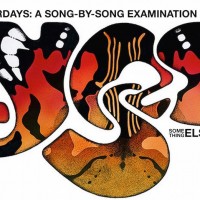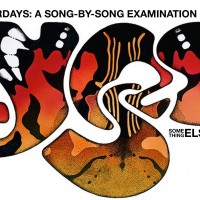Since YESterdays concluded of our song-by-song analysis, and before we jump into non-album Yes tracks, we have been reflecting on our favorite albums by the worlds greatest progressive rock band. Here are mine:
DRAMA (1980): The last time I interviewed Jon Anderson, he mentioned that Yes music is about progressing. I doubt he had the Trevor Horn/Geoff Downes-era album Drama in mind when we said this. No matter your thoughts on replacing Anderson, there is no doubt from the opening guitar salvo of “Machine Messiah” to the frenzied bass lines of Chris Squire in “Tempus Fugit” that the band was intent on expanding its reach and scope. Drama is an excellent album that only gains stature as the years go by. I mentioned way back in July 2014 that Drama is overlooked. That’s no longer true.
THE YES ALBUM (1971): The Yes Album, according to Yes Music Podcast founder Kevin Mulryne starts the main sequence of Yes albums. Indeed, the album is a significant leap forward from 1970’s Time and a Word with the addition of the stringed instrument phenom Steve Howe. Equally important are the production skills of Eddie Offord, and the writing contributions by Chris Squire, Tony Kaye, Jon Anderson and the aforementioned Howe. “Yours is No Disgrace” starts the string of classic songs and great playing. One could lament that this version of Yes only lasted one album, but they did go on to higher highs with their second keyboardist.
THE LADDER (1999): As with The Yes album, this version of the band lasted just one album. The addition of keyboardist Igor Khoroshev on keyboards and Billy Sherwood on guitar added a spark which was missing from Yes for more than a decade. Add in the focus of producer Bruce Fairbairn, stellar songs such as “Homeworld (The Ladder)” and “Face to Face,” and you have perhaps the most overlooked Yes album.
GOING FOR THE ONE (1977): The YESterday series has revealed to me that the are no bad Yes albums featuring Rick Wakeman’s participation. (Union doesn’t count, since most of Wakeman parts were erased or altered by the producer.) Of course, Going for the One was an album where Wakeman wasn’t even a band member during preproduction. But “Awaken,” composed by Steve Howe and Jon Anderson, was transformed by the subsequent contributions of Wakeman. The Squire-written “Parallels,” and the rocking and rolling, steel guitar drenched title track demonstrate that this great band could be even better.
90125 (1983) The Yes Human Resource department (aka Chris Squire) pulls together a new version of the band, including the legendary original lead singer, the last lead singer-turned-producer, a new guitar god and the original keyboardist melded with the long-standing, rocking rhythm section. The result is a diverse, powerful, yet progressive hit album. My favorite songs are the band-produced “Changes” and “Hearts” (Yes, Kaye co-wrote it and contributed an old fashion Hammond B-3 solo). Of course, the album contains the biggest song in Yes history too.
- The Blackbyrds – ‘City Life’ (1975; 2025 reissue) - June 9, 2025
- Fernando Perdomo – ‘Waves 6’ (2025) - June 8, 2025
- Thelonious Monk – ‘Thelonious Himself’ (1957; 2025 vinyl reissue) - May 26, 2025



